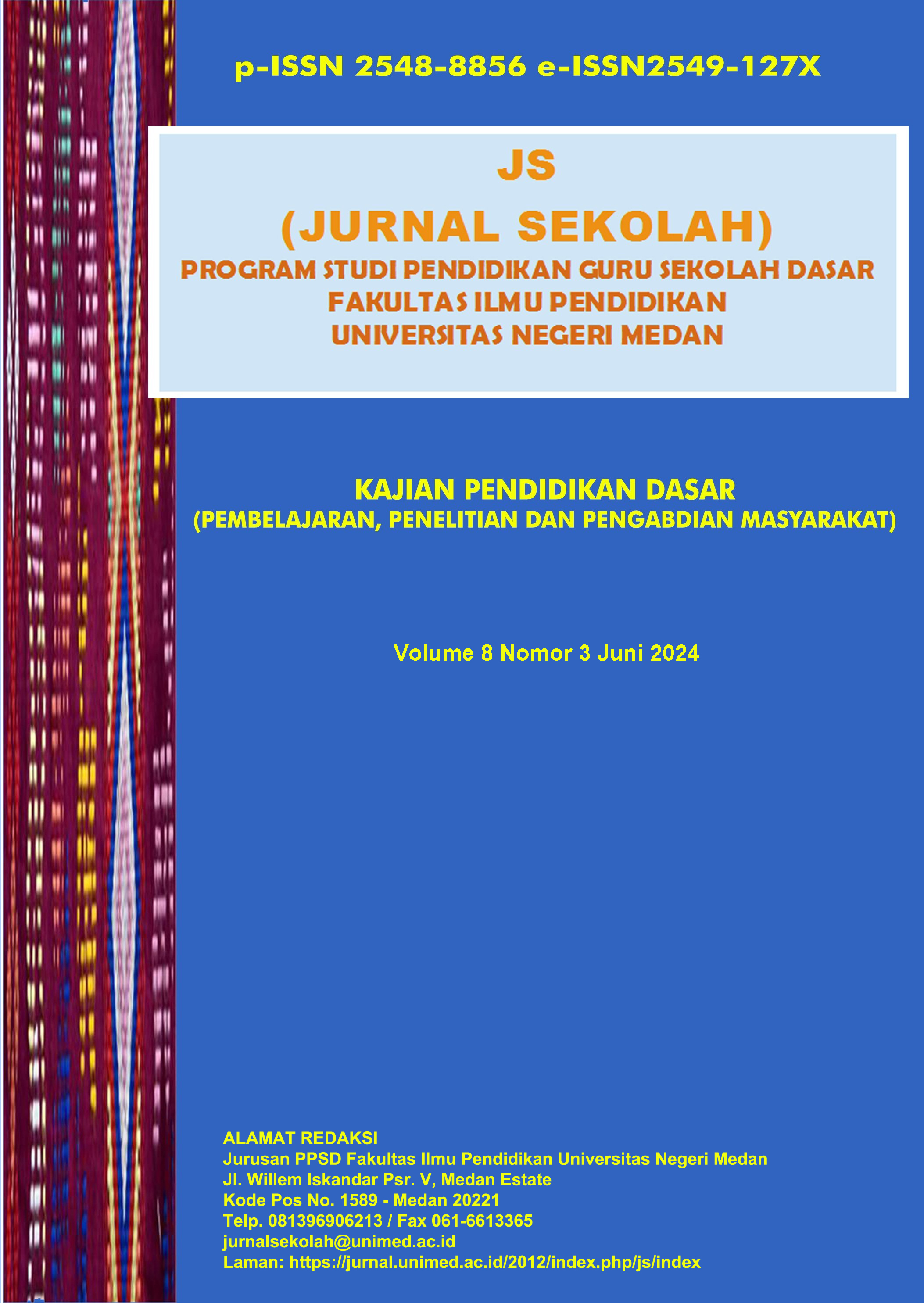PENGARUH MODEL PEMBELAJARAN BERBASIS MASALAH (PROBLEM BASED LEARNING) TERHADAP HASIL BELAJAR KOGNITIF PENDIDIKAN PANCASILA PESERTA DIDIK KELAS V SEKOLAH DASAR
DOI:
https://doi.org/10.24114/js.v8i3.56601Abstract
Abstract: This research aims to prove the influence of the problem based learning (PBL) model on cognitive learning outcomes in fifth grade elementary school. This research utilizes a quantitative methodology, particularly employing a Pre-Experimental Design referred to as the One-Group Pretest-Posttest Design. The primary objective of the study is to evaluate the influence of the problem-based learning (PBL) approach on the cognitive learning achievements of fifth-grade students attending SDN Karangrejo 02 Semarang during the academic year 2023/2024. The sample for this study consists of 23 students. Data analysis involved several statistical tests including normality test, t-test, and n-gain test conducted using SPSS version 16 software.The normality test results for both pretest and posttest scores yielded values of 0.326 and 0.338 respectively, both above the significance level of 0.05, indicating a normal distribution of the data. The ttest yielded a significance value (sig) of 0.000, The results show a notable variance in students' cognitive learning achievements prior to and following the introduction of the PjBL model. Moreover, with a two-tailed significance value of 0.000 being below 0.05, it resulted in the dismissal of the null hypothesis (ð»0) and affirmation of the alternative hypothesis (ð»ð‘Ž), signifying a substantial influence of the PjBL model on cognitive learning outcomes. Additionally, the n-gain test results indicated a considerable improvement in learning outcomes, with the pretest scores ranging from 55.22 to 82.61 and posttest scores showing an average increase of 27.39 with an average n-gain of 0.66, meeting the criteria for being quite effective. Thus, it can be concluded that the implementation of the problem-based learning (PBL) model positively influences the cognitive learning outcomes of fifth-grade Pancasila Education students in elementary schools. Keyword: Cognitive Learning Outcomes, Problem Based Learning Abstrak: Penelitian ini bertujuan untuk membuktikan pengaruh model problem based learning (PBL) terhadap hasil belajar kognitif kelas V sekolah dasar. stud ini termasuk jenis penelitian kuantitatif dengan desain studi Pre-Experimental Designs jenis One-Group Pretest-Posttest Design. Adapun Populasi yang dipergunakan pada studi ini yakni seluruh peserta didik kelas V di SDN Karangrejo 02 Semarang yang berjumlah 23 peserta didik tahun ajaran 2023/2024. Analisa data pada studi ini memanfatkan uji normalitas, uji t-test serta uji n-gain berbantuan aplikasi SPSS versi 16. Uji normalitas didapat sesuai dengan nilai pretest 0,326 > 0,05. Sementara hasil nilai postest memperlihatkan jika 0,338 > 0,05. Dari data hasil uji normalitas bisa ditarik simpulan jika nilai pretest serta postest berdistribusi normal. Uji ttest didapat sesuai dengan sig (2- tailed) 0,000 jadi 0,000 < 0,05, oleh karenanya bisa diambil simpulan apabila ada perbedaan yang signifikan diantara hasil belajar kognitif peserta didik sebelum serta setelah diterapkanya model PBL pada hasil pretest serta postest. Nilai sig 2-tailed senilai 0.000 < 0.05 oleh karenanya ð»0 ditolak serta ð»ð‘Ž diterima. Uji n-gain didapat dari hasil pretest senilai 55,22 menjadi 82,61 sementara pada hasil postest dengan selisih rata-rata senilai 27,39 serta mengalami peningkatan rata-rata (n-gain) senilai 0,66 termasuk dalam kriteria cukup efektif. Maka bisa ditarik simpulan jika model PBL dinyatakan berpengaruh pada hasil belajar kognitif Pendidikan Pancasila kelas V di Sekolah Dasar.Kata Kunci: Hasil Belajar Kognitif, Pembelajaran Berbasis MasalahDownloads
Published
2024-06-04
Issue
Section
Articles
License
Copyright (c) 2024 Novita Tidar Andani, Harto Nuroso, Chadwan Dwi Yoganingsih

This work is licensed under a Creative Commons Attribution-ShareAlike 4.0 International License.

Jurnal Sekolah is licensed under a Creative Commons Attribution-ShareAlike 4.0 International License.


1.png)




.png)


.png)

.png)
